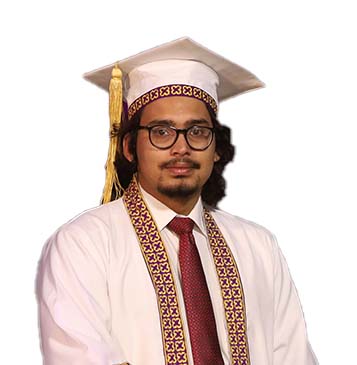
ADIL ALI KHAN
Aspiration Statement
I aspire to work in a role that utilizes my technical and managerial skills. I am inclined towards the domain of controls, instrumentation, and power. I hope to work in the power industry where there is potential for innovative projects.
Core Skills
- Python, C, C++
- MATLAB
- MS Office, LaTeX
- GX Developer (PLC), Proteus, OrCAD PSpice, Atmel Studio, SketchUp
Academic Awards / Achievements
- HU Meritorious Award - Outstanding Academic Achievement in 2017
- 100% Yohsin Scholarship
- Dean's Honor List Spring 2018
- Summer Exchange Program at University of Wisconsin - Stout, Wisconsin, USA (August 2019 - December 2019)
- Completed US Department of State's "Leadership/Co-Curricular, Engagement and Action for Pakistan" (LEAP) Program
Experience
Leadership / Meta-curricular
- Orientation Leader (2018)
- Electrical Engineering Batch of 202 - Elected representative
- Habib University Student Government, 2018 - Secretary of Senate
- 2nd Runners-up Invent For The Planet (IFTP 2020) at Habib University by working on an idea of re-utilizing heat losses through Thermo-Electric Generation of Electricity using Peltier module 12706
Internship / Volunteer Work
- K-Electric - Graduate Trainee
- Habib University - Teaching Assistant, Introduction To Electrical Engineering
Publications / Creative Projects
- GeneTech 2.0: Improved Genetic Circuit Synthesis and Technology Mapping: Paper accepted for presentation at the 10th International Workshop for Bio-Design Automation, UC Berkeley, California. (See pp. 81-83) www.iwbdaconf.org/2018/docs/IWBDA18Booklet.pdf
Final Year Project
Project Title
Development of a cart-mounted inverted pendulum test-bench
Description
The inverted pendulum is a classical control problem that involves indirectly actuating a pendulum in such that the actuation leads to the pendulum attaining an upright inverted position with its center of mass directly above the pivot. The motivation for pursuing this project came from our interest in control theory and computer vision, both of which were bolstered through two-course projects. We believe that having students engage with such an interesting theoretical control problem could help kindle their curiosity in the course content and strengthen their understanding of it. Additionally, the availability of such a platform could also motivate students to pursue research in the rich domain of control theory. It is also important for Habib University to be able to offer its students such research avenues. Because acquiring commercially available solutions for each research tangent would add a significant financial strain on the institution, this project can now be adapted to different research purposes.